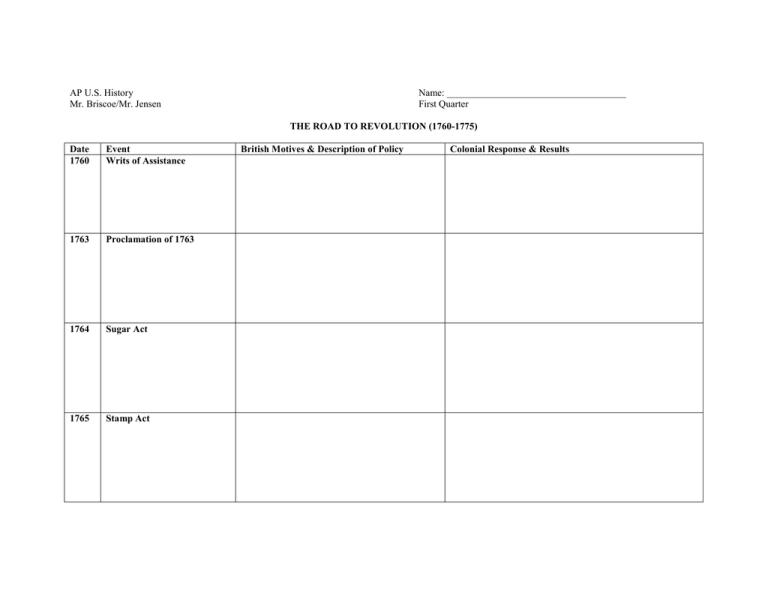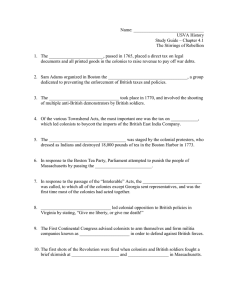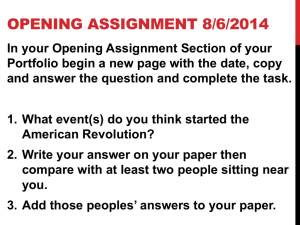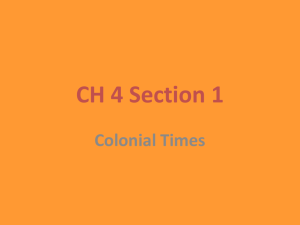AP U.S. History Name: _____________________________________ Mr. Briscoe/Mr. Jensen
advertisement

AP U.S. History Mr. Briscoe/Mr. Jensen Name: _____________________________________ First Quarter THE ROAD TO REVOLUTION (1760-1775) Date 1760 Event Writs of Assistance 1763 Proclamation of 1763 1764 Sugar Act 1765 Stamp Act British Motives & Description of Policy Colonial Response & Results 1767 Townshend Acts 1770 Boston Massacre 1773 Tea Act 1774 Intolerable Acts 1775 Battles of Lexington & Concord *British army in Boston short of food, low morale *British General Gage sends 700 British troops from Boston to seize Patriot weapons stockpile at Concord (MA) *Minutemen (colonial militia) fire on British troops at Lexington and then at Concord *British troops retreat to Boston under constant fire *open rebellion (Revolutionary War) begins AP U.S. History Mr. Briscoe/Mr. Jensen Name: _____________________________________ First Quarter THE ROAD TO REVOLUTION (1760-1775) Date 1760 Event Writs of Assistance British Motives & Description of Policy *sought to crack down on colonial smuggling *allowed the British crown to search any ship or building suspected of being associated with smuggling *often allowed search of private homes Colonial Response & Results *James Otis, Jr. (Boston lawyer) challenged the writs in court, calling them “unconstitutional” and a violation of English civil liberties *angered New England merchants and encouraged more smuggling 1763 Proclamation of 1763 *Pontiac’s Rebellion of 1763 raised concerns that English settlement west of the Appalachian Range would spark further conflict with Native Americans *British government banned all English settlement west of the line in order to keep peace *angered colonists who sought more land for farming and real estate speculation (ex: George Washington) *colonists continued to move west in violation of the ban 1764 Sugar Act *aimed at raising revenue to pay for Britain’s war debt (external, indirect tax) *lowered tax on foreign molasses to discourage smuggling *placed duties on certain imports *gave authority to vice-admiralty courts to try smugglers *angered New England merchants, who saw it a way to raise revenue for the British government at their expense *encouraged more smuggling *did not effectively raise much revenue 1765 Stamp Act *Parliament sought to raise revenue with an internal, direct tax on all documents and paper products (e.g., newspapers, deeds, licenses, etc.) *violators were to be tried in the vice-admiralty courts, not in colonial courts *Sam Adams organized the Sons of Liberty to protest the Act *campaign of harassment against stamp agents *colonial legislatures resolved that there would be “no taxation without representation” *Stamp Act Congress issues Declaration of Rights and Grievances (organized colonial resistance) *repealed by parliament in the Declaratory Act of 1766 1767 Townshend Acts *British government returned to external, indirect taxes on imports to raise revenue to pay off debt (included taxes on tea, glass, lead, paint, etc.) *colonial leaders organized a boycott of British imports *colonial women protested by making their own clothing in “spinning bees” (homespun clothing) *seizure of John Hancock’s Liberty resulted in riots by Boston residents in 1768 *British sent 2,000 troops to Boston *repealed all of the duties, except that on tea in 1770 1770 Boston Massacre *dockworkers confronted British soldiers over jobs in Boston *Crispus Attucks and four other colonists were killed when gunfire broke out *Sam Adams and the Sons of Liberty used the incident to highlight British tyranny *tensions relaxed for two years until colonists in Rhode Island attacked a British vessel that had run aground *committees of correspondence arose in the colonies to coordinate efforts to resist unfair trials 1773 Tea Act *Lord North (British PM) designed the Act to give the British East India Company a monopoly on the tea trade; actually lowered the price of tea for colonists *Sons of Liberty organize the Boston Tea Party and dump 18,000 pounds of British East India Company tea into Boston Harbor 1774 Intolerable Acts *First Continental Congress met in Sept. 1774 to devise a coordinated response – sent demands/grievances to King George III and pledged to reconvene in May 1775 if demands were not adequately addressed *Massachusetts Patriots formed their own government (led by Sam Adams and John Hancock) 1775 Battles of Lexington & Concord *King George III and parliament sought to punish the Massachusetts colony: 1. shut down Boston harbor to trade 2. authorized British troops to house in private homes and other private property 3. placed Massachusetts under martial law 4. revoked the Massachusetts charter (aka, the Coercive Acts) *Quebec Act limited westward settlement *British army in Boston short of food, low morale *British General Gage sends 700 British troops from Boston to seize Patriot weapons stockpile at Concord (MA) *Minutemen (colonial militia) fire on British troops at Lexington and then at Concord *British troops retreat to Boston under constant fire *open rebellion (Revolutionary War) begins





